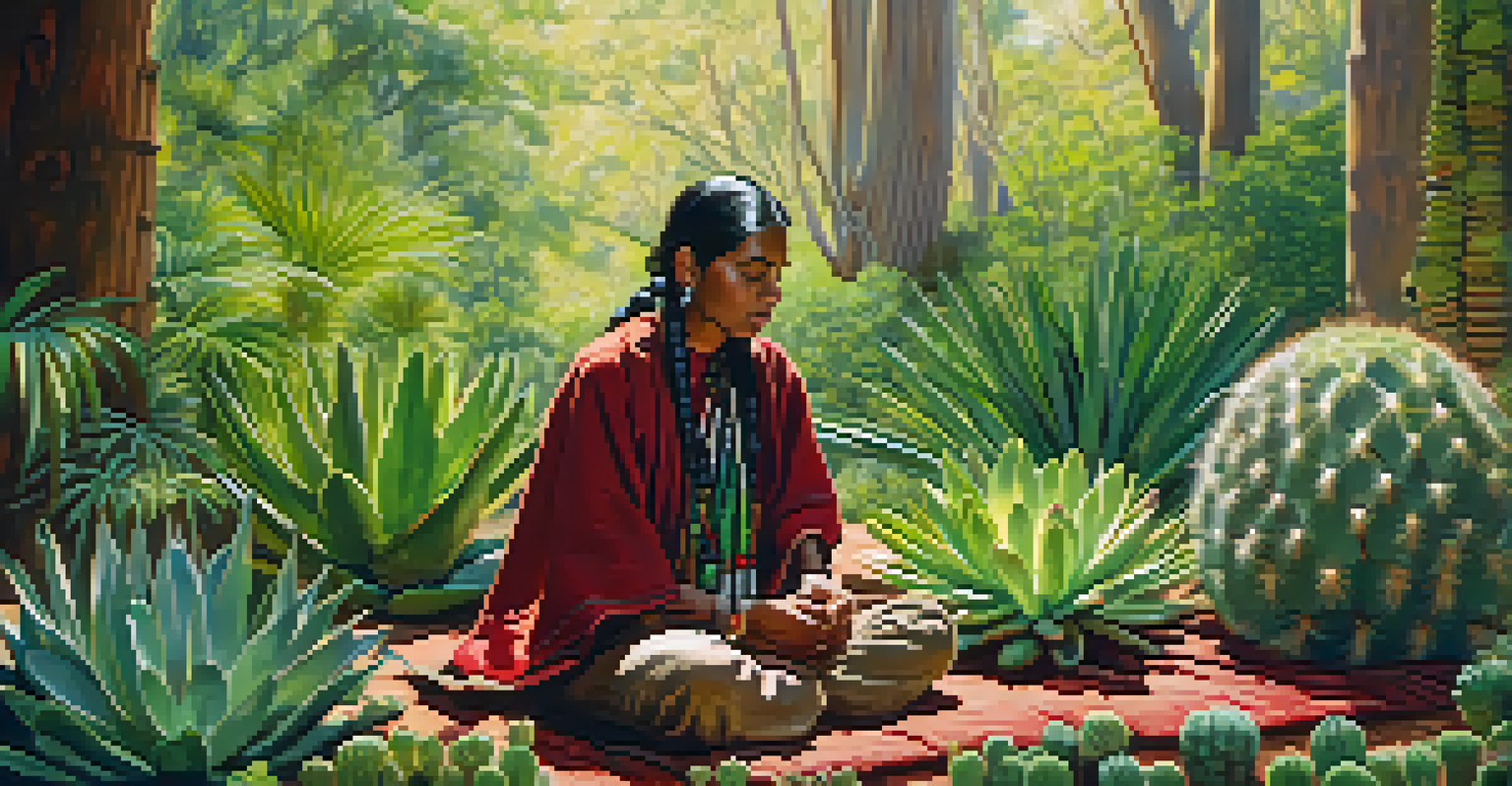Peyote, Climate Change, and Environmental Ethics

Understanding Peyote: A Cultural and Ecological Treasure
Peyote, a small cactus native to the southwestern United States and Mexico, has been used for centuries in spiritual ceremonies by Indigenous peoples. This sacred plant is not just significant culturally; it also plays a crucial role in the ecosystems where it grows. As we delve into the relationship between peyote and the environment, it's essential to recognize its importance beyond mere recreational use.
In nature's economy, the currency is not money, but life.
The ecological niche that peyote occupies is intertwined with various plant and animal species. Its presence supports biodiversity, providing habitat and sustenance for certain creatures. However, the increasing pressures from climate change threaten its natural habitat, making understanding its ecological role even more urgent.
In a world where many species are at risk, peyote serves as a reminder of the vital link between culture and ecology. Protecting peyote is not just about preserving a plant; it's about maintaining the health of entire ecosystems and honoring the traditions of Indigenous communities that rely on it.
The Impact of Climate Change on Peyote Populations
Climate change has shifted weather patterns, resulting in unpredictable rainfall and temperature extremes that directly affect peyote growth. As these environmental conditions change, the habitats where peyote thrives are becoming increasingly inhospitable. This disruption not only threatens the plant's survival but also the cultural practices tied to it.

Moreover, the rise in temperatures can lead to increased competition from invasive species, which often outcompete native plants for resources. As peyote struggles to adapt, the delicate balance of its ecosystem is further jeopardized. This situation prompts us to consider how climate change disproportionately impacts Indigenous communities who depend on peyote.
Peyote's Cultural and Ecological Role
Peyote serves as a vital link between cultural traditions and ecological health, highlighting the importance of protecting both the plant and its habitat.
The loss of peyote due to climate change can lead to a decline in spiritual practices and cultural identity for many Indigenous groups. Thus, addressing climate change is not merely an environmental issue; it’s a matter of preserving cultural heritage and ensuring that future generations can connect with their traditions.
Environmental Ethics: A Framework for Action
Environmental ethics is a philosophical discipline that examines the moral relationship between humans and the environment. It prompts us to consider our responsibilities toward the natural world and encourages us to act in ways that preserve ecological integrity. This framework is crucial as we seek solutions for the challenges posed by climate change, particularly regarding peyote.
We do not inherit the earth from our ancestors; we borrow it from our children.
By adopting an ethical approach, we can advocate for policies that protect peyote habitats and promote sustainable practices. This involves recognizing the intrinsic value of peyote beyond its use in rituals, as well as acknowledging the rights of Indigenous peoples to maintain their cultural practices. Such an ethical standpoint fosters a sense of stewardship over the land.
Ultimately, integrating environmental ethics into our actions can inspire collective efforts to combat climate change. It serves as a call to action, urging individuals and communities to consider how their choices impact not only peyote but the broader ecological systems that sustain life.
The Role of Indigenous Knowledge in Conservation
Indigenous knowledge systems are rich with insights that have been honed over millennia, providing valuable lessons in sustainable land management. These practices emphasize a deep respect for nature and a recognition of the interconnectedness of all living things. When it comes to the conservation of peyote, these traditional ecological understandings are vital.
Many Indigenous communities have long understood the rhythms of nature and the importance of biodiversity. By incorporating these perspectives into modern conservation efforts, we can develop more effective strategies to protect peyote and its habitat. This collaboration honors the rights of Indigenous peoples while benefiting the environment as a whole.
Climate Change Threatens Peyote
The impacts of climate change are jeopardizing peyote populations, which in turn threaten the spiritual practices of Indigenous communities.
Embracing Indigenous knowledge not only enriches our understanding of peyote but also fosters a sense of responsibility towards the land. It encourages a holistic approach to conservation that recognizes the significance of cultural heritage, ultimately leading to more sustainable outcomes in the face of climate change.
Legislation and Policy: Protecting Peyote and Its Habitat
Legislation plays a crucial role in the protection of peyote and its natural environment. Policies that prioritize the preservation of habitats, alongside the rights of Indigenous communities, are essential to ensuring the survival of this sacred plant. Advocacy for such legislation is necessary to combat the threats posed by climate change and habitat loss.
Efforts to protect peyote must also include raising awareness about its ecological and cultural significance. By educating policymakers and the public, we can build support for initiatives that safeguard not only peyote but the ecosystems that depend on it. This holistic approach can create more robust policies that address the multifaceted challenges of environmental conservation.
Moreover, successful legislation can serve as a model for protecting other endangered species and habitats. By demonstrating the interconnectedness of culture, ecology, and ethics, we can inspire a broader movement toward environmental stewardship that benefits both the planet and its inhabitants.
Community Engagement: Grassroots Movements for Change
Grassroots movements have the power to drive significant change at local, national, and even global levels. Communities, particularly those with a strong connection to peyote, can mobilize efforts to raise awareness about its plight amid climate change. These initiatives often bring together diverse groups, fostering solidarity and shared responsibility for environmental stewardship.
Through workshops, educational events, and community campaigns, grassroots organizations can amplify the voices of Indigenous peoples and highlight the cultural importance of peyote. This engagement not only empowers communities but also creates a sense of urgency around environmental issues that often go unnoticed.
Indigenous Knowledge in Conservation
Incorporating Indigenous knowledge into conservation efforts is essential for developing effective strategies to protect peyote and its ecosystems.
As these movements gain momentum, they can influence policy changes and help shape a more sustainable future. Community engagement is a vital component in the fight against climate change, emphasizing the collective responsibility we all share in protecting our planet and preserving its rich cultural heritage.
Looking Ahead: A Sustainable Future for Peyote and the Planet
As we contemplate the future of peyote in the face of climate change, it’s clear that a sustainable approach is necessary. This involves not only protecting the plant itself but also revitalizing the ecosystems that support it. By prioritizing conservation and sustainable practices, we can work towards a future where peyote and its cultural significance endure.
Innovative solutions, such as sustainable harvesting techniques and habitat restoration projects, can help ensure the longevity of peyote populations. Additionally, fostering collaboration between Indigenous communities and environmental organizations can lead to more effective strategies for addressing the challenges posed by climate change.

Ultimately, the goal is to create a harmonious relationship between humanity and the natural world. By embracing sustainability, we can honor the traditions tied to peyote while also safeguarding the environment for future generations. The journey ahead may be complex, but with collective effort and a commitment to ethical stewardship, we can cultivate a future that respects both culture and nature.